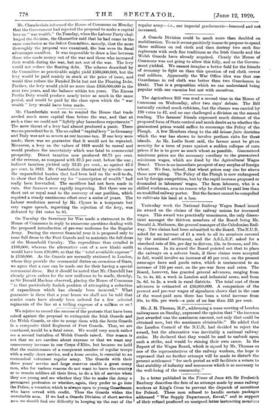Mr. Chamberlain went on to remind the House that trade
needed much more capital than before the war, and that at such a time we could not "lightly play hazardous experiments." The mere threat of a levy had almost produced a panic. There. was no precedent' for it. The so-called "capital levy " in Germany' and Italy was not so severe as our income-tax. If one' levy were• made, there was no guarantee that it would not be repeated. Moreover, a levy on the values of 1919 would be unreal and would produce the uncertainty -which was 'fatal to commercial prosperity. Direct taxation now produced 66.75 per cent. of the revenue, as compared with 57.5 per cent. before the war ; indirect taxation yielded only 33.25 per cent., as against 42.5 per cent. in 1913. Mr. Chamberlain illustrated by specific cases the unparalleled burden that had been laid on the well-to-do, to show that the Labour cry for conscription of wealth" had really been forestalled. The sacrifices had not been made in vain. Our finances were rapidly improving. But there was no short cut or royal road to the recovery of our position, which required a steady continuous effort over a series of years. The Labour resolution moved by Mr. Clones in a temperate but very vague speech, regretting the rejection of the levy, was defeated by 244 votes to '81.






































 Previous page
Previous page